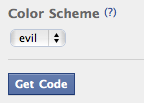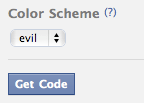
The tech community is still digesting the implications of Facebook’s plans to spread its “Like” buttons everywhere and take over the Web with its so-called Open Graph. The Open Graph is a hugely ambitious project to build social hooks into every Website. It aims to add a layer of social connections and instant personalization based on people’s interests and “likes” on every single page on the Web. It is also the basis for a Web-wide identity system based on Facebook IDs.
The Open Graph is open only in name. It is a Facebook-controlled protocol and set of APIs. Facebook takes the data but doesn’t give back in the same degree. It is open, says Kevin Marks, as in “open your underwear drawer.” All Of Your Likes Are Belong To Us. Already, advocates of the open Web are stirring and rallying against this proposed social hegemony. Hunch founder/seed investor Chris Dixon and a ragtag crew of other New York City technologists are arguing for a counterweight in the form of the OpenLike protocol, which adds like buttons from other sites beyond Facebook such as Digg, StumbleUpon, and Hunch. Dixon Tweets:
it’s actually open! not open in the opengraphprotocol zuck will decide sense but you-can-do-whatever-you-want open!!
Chris Messina (aka, Mr. OpenID) explains his objection in a blog post:
Here’s the rub though: those Like buttons only work against Facebook. I can’t just be signed in to any social web provider… it’s got to be Facebook. And on top of that, whenever I “like” something, I’m sending a signal back to Facebook that gets recorded on both my profile, and in my activity stream.
Ok, not a big deal, but think laterally: how about this? What if Larry and Sergey wanted to recreate PageRank today?
You know what I bet they wish they could have done? Forced anyone who wanted to add a page to the web to authenticate with them first. . . . Authenticated PageRank where everyone that wants to be listed has to get a Google account first. Sounds kind of smart, right?
Except — shucks — there’s one problem with this model: it’s evil.
A lot of this boils down to a nerd fight that Zuckerberg is likely to win. After all he has nearly 500 million users on his side, who everyone else wants access to. These open alternatives are starting at zero. However, Facebook cannot be surprised at this reaction. In fact, there is some evidence it anticipated it (one of the color-scheme options for the like button, now since gone, was to set it to “evil”). It needs to tread carefully, though, and make some goodwill gestures to make the Open Graph actually more open in the sense that it doesn’t just exist on its databases.
We should all be able to take our likes with us to Twitter, or Google, or any of a million Websites. Yeah, we all know the chances of that happening. In the meantime, be sure to hit the like button at the top of this post.
